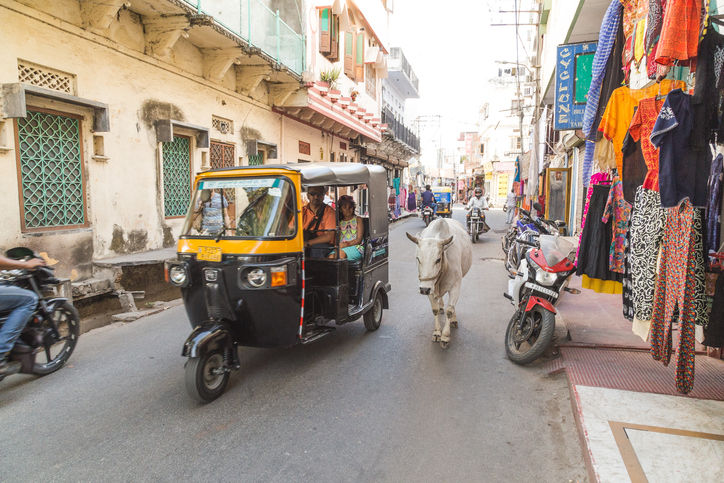University life in: India
What is it like to study in India? Find out everything you need to know about fees, accommodation and lifestyle when going to university in India
Share
�й�AƬ
India, with its rich history and diverse cultures, is a unique country in the midst of an ongoing cultural and ideological evolution.��With the second highest population on Earth and the second highest number of educational institutions, this South Asian powerhouse is becoming more attractive to international students looking to explore the world.
Moving to��a new country comes with a list of concerns and requires a long period of preparation, so here’s our guide on getting the most out of studying in India.
Deciding to visit a country as vast as India can be daunting, particularly when planning a prolonged stay with a view to furthering your education at one of India's many universities. Luckily for international visitors, modern India is a warm, inviting environment, keen to open its doors to the world. While education has suffered in the past, recent proposals and initiatives have led to a resurgence in the quality of academia and with it a renewed interest from international students as a possible destination alongside more traditional overseas study spots.
The recently launched Study in India programme seeks to attract more than 200,000 international students by 2023, a lofty goal considering there were currently just over 45,000 students officially enrolled in 2016, and India exports the second highest number of students to universities around the world.
The country radiates life and the hustle and bustle of its��cities��can be exciting but also confusing for first-time visitors.
First arriving
As with any trip, preparations should begin long before you enter the country, including ensuring that your visa application is accepted in plenty of time. Unlike some countries, this process is relatively easy, as the Indian government is currently trying to entice students into the country.
Once the visa is secured, you will need to visit a World Health Organization recognised HIV/Aids testing clinic to receive an “all clear” report for use upon arrival when registering with the Foreigner Regional Registration Office (FRRO).
As in��many countries, international students are not permitted to work on a student visa; therefore financial arrangements will need to be handled prior to departure as you will be asked for proof of self-sustainability during your stay. While scholarships are available, much of India’s work to bring in students takes place outside the UK, therefore British students won’t have quite as much choice.
Services such as Uber (and its Indian counterpart Ola) operate in the larger cities of India, although a ride on the more outlandish rickshaws can offer a more authentic experience. Just be wary of prices in the immediate vicinity of any airports as tourists and foreigners can be targeted with inflated prices.
All students are required to register with their local FRRO within two weeks of arrival. This process should be simple providing you have all your documents in order including passport, visas, residency details, admission certificate from the university, proof of financial stability and the results of the HIV test taken before arriving.

Academia
The good news for anyone considering an Indian university is that all courses are delivered in English. English and Hindi are India’s official national languages, although many more languages are spoken across the states.
Higher education in��India has risen in international rankings over the past decade. It is the third most represented country in the Asia University �鲹�쾱�Բ���.��
Degrees available broadly match those of the British system, starting with bachelor’s and progressing to master’s and doctoral levels.
Indian universities are well-known for their particularly high standard in engineering, but there are a number of specialist institutes covering other areas too, such as the Tezpur University.
Best universities in India
Best universities in Asia
Personal development at IIT Guwahati, India
Lifestyle
Similar to nearby China, India’s student life can vary dramatically depending on where in the country’s many districts you are. Overall, the cost of living is much lower than it is for students in Europe – frugal students could survive on as little as £3,500 a year. Most universities taking in international students will help with accommodation leaving you with plenty of similarly-aged people to interact with while exploring the Indian culture.
India’s��food is world-renowned and there is nothing quite like eating��it in its natural home. One surprising��difference may be the relative lack of meat dishes. India��has the largest vegetarian population on earth; an estimated 42 per cent do not eat meat, mainly��for religious reasons. When it comes to alcohol, you will need to check the local laws as the legal drinking age varies across states and is prohibited entirely within Bihar, Nagaland, Gujarat and Lakshadweep.
India’s��historical landmarks are a must-see. There are 37 Unesco��World Heritage sites, including the Taj Mahal and Agra Fort. Other popular tourist attractions include the Golden Temple of Amritsar and the Red Fort in New Delhi.
Travelling to these destinations can be tricky for newcomers; while taxis do run they can be extremely expensive when trying to cover large distances. In their place, trains are the most convenient method of getting around but can be a testing experience for those not accustomed to them. Trains in India are typically divided into different classes, ranging from sleeper class (packed, hot and loud) through to AC 1 (air-conditioned, less crowded,��usually cleaner). Ticket prices,��like most things in the country, are much cheaper than those in Western nations.��
India is a��growing economy��and its educational systems are continually evolving to attract a greater number of overseas students. This diverse land offers a chance to experience another style of living, visit some of the world’s greatest sites and try new foods. Health care is cheap and the many benefits of studying there largely outweigh any drawbacks.



